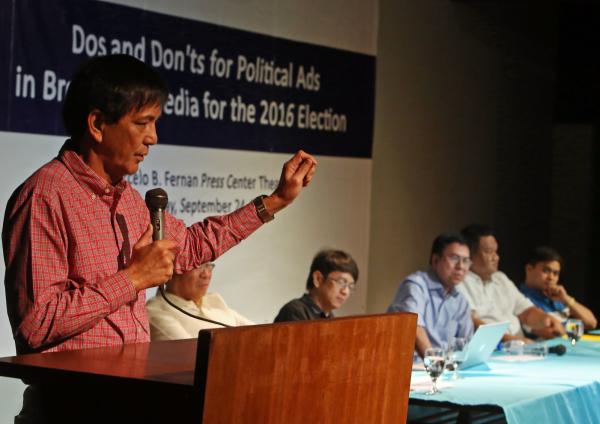
Cebu city Mayor Michael Rama calls for fairness in news coverage during a forum on political adds for the 2016 election. The forum was organized by the KBP-Cebu chapter and Philippine Information Agency at the Marcelo Fernan Cebu Press Center. with him is lawyer Frank Malilong, Comelec provincial officer Ferdinand Gujilde, dyAB station manager Leo Lastimosa, Comelec provincial director Lionel Marco Castillano and station manager Ruphil Banon of dyHP. (CDN PHOTO/ LITO TECSON)
Broadcasters in Cebu were urged to follow legal limits of political ads for the 2016 election – 60 minutes per station for TV ads and 90 minutes for radio.
But on their own, they would rather police themselves by following standards in the Kapisanan ng mga Brodkaster ng Pilipinas (KBP) Broadcast Code.
Ruphil Bañoc, dyHP station manager and former KBP-Cebu chapter president, said members can level the playing field and give equal air time for all apsirants, a right assured in Republic Act 9006 or the Fair Elections Act.
“We prefer self-regulation. We should not wait for the state to dictate us since they don’t have the expertise and experience. We broadcasters have it. If we follow the KBP Code, essentially, we also follow the Fair Elections Act,” Bañoc said.
The KBP Cebu held a forum on the do’s and don’ts for political ads in the broadcast media for the 2016 elections at the Marcelo B. Fernan Cebu Press Center.
The forum was co-sponsored by the Philippine Information Agency in Central Visayas (PIA-7) and the Visayan Electric Co. (Veco).
Equal space
Bañoc said equal space for all candidates is provided in Article 8 of the KBP Code which focuses on political propaganda.
Aside from following the guidelines in RA 9006, Bañoc said radio and TV stations have to make sure that they don’t unduly favor a candidate over the other.
He said if broadcasters run for public office or will actively campaign for a candidate, they should go on leave or even resign from their job.
During yesterday’s forum, Provincial Election Officer Ferdinand Gujilde presented rules and regulations for election propaganda.
In print, political ads should not exceed one-fourth page of a broadsheet and not more than one-half page for tabloids.
These print ads should can come out not more than three times a week.
Gujilde said the media can help the Comelec ensure fair play by submitting copies of political advertising contracts to the commission five days from its signing.
They should also give prior notice to the Comelec when they do features on candidates so the office can monitor their appearances and ensure that there is equal opportunity among candidates.
Cebu City Mayor Michael Rama, one of the speakers, appealed to the l media to recognize his accomplishments.
Truth in advertising
“Kung naa koy maayo, dayega sad ko, uy. Kung naa koy sayop, tirahi lang pud ko (If I do something goo, praise me. If I have failures, criticize me). I’m not onion-skinned,” Rama said.
Sun.Star Cebu columnist and lawyer Frank Malilong, said the idea of leveling the playing field for all candidates was “hypocrisy.”
He said it can’t be done especially because premature political advertising is not prohibitied based on the Supreme Court’s ruling that candidates will only be considered as such when they file their Certificates of Candidacy.
This allows aspirants with resources to put out political campaign ads without fear of being sanctioned since technically he is not yet a candidate.
Malilong said there should be a government agency that looks into truth in political advertising. But Gujilde said Comelec can’t do it.
“Comelec is not empowered to inquire into the content of political advertisements. It’s up to the voters to discern for themselves whether or not a candidate is telling the truth,” Gujilde said.